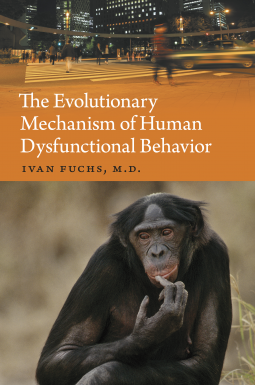
The Evolutionary Mechanism of Human Dysfunctional Behavior
Relaxation of Natural Selection Pressures throughout Human Evolution, Excessive Diversification of the Inherited Predispositions Underlying Behavior, and Their Relevance to Mental Disorders
by Ivan Fuchs
This title was previously available on NetGalley and is now archived.
Send NetGalley books directly to your Kindle or Kindle app
1
To read on a Kindle or Kindle app, please add kindle@netgalley.com as an approved email address to receive files in your Amazon account. Click here for step-by-step instructions.
2
Also find your Kindle email address within your Amazon account, and enter it here.
Pub Date Apr 18 2019 | Archive Date Nov 11 2019
Description
In this work, Dr. Ivan Fuchs provides his theory on human dysfunctional behavior rooted in Darwinian evolutionary thinking. His theory includes:
1. An attempt to identify the basic evolutionary mechanism that leads to dysfunctional or maladaptive behavior that is increasing in human populations. He proposes that this mechanism consists of progressive relaxation of selection pressures originating in the natural environment as a result of the technological and cultural development in human civilization. These developments protect against many natural inconveniences and dangers such as harmful weather conditions; scarce or unreliable food supplies; cruel, even deadly competition for life-sustaining or reproductive resources; danger of predation, and so on. The relaxation of natural selection pressures leads to excessive diversification of innate predispositions that, due to the complexities of social coexistence, has both far-reaching beneficial, as well as harmful, consequences.
2. Dr. Fuchs deals primarily with severe forms of dysfunctional behavior (categorized as mental disorders), pinpointing those genetically based behavioral complexes which predispose humans to anxiety, affective and personality disorders, paranoia, and schizophrenia.
3. Dr. Fuchs also makes clear that the above innate predispositions cannot lead by themselves to the whole clinical picture of diagnosable mental disorder categories. In order for full-blown clinical symptomatology to develop, the innate predisposition has to interact with influences after childbirth, first of all, learning. Consequently, psychiatric understanding and research has to distinguish sharply between those mental (brain) structures and functions which constitute the innate predisposition to a certain mental disorder versus those ones involved secondarily during the lifespan. This consideration is detailed in the case of schizophrenia spectrum of disorders.
The above theoretical considerations have important therapeutic, preventive and research implications.
Available Editions
| EDITION | Other Format |
| ISBN | 9781635766011 |
| PRICE | $59.99 (USD) |
| PAGES | 604 |
Featured Reviews
 Educator 553633
Educator 553633
As a psychiatrist and scientist, Dr. Ivan Fuchs asks the most basic of questions related to his practice and fields of study on which it is built. It is the question any three-year old asks, "Why?" By posing this basic question, “What happened to natural selection during human phylogeny (i.e., over the course of human evolutionary history),” Fuchs focuses attention on the single element underlying all of psychiatry. He goes beyond description and diagnosis, and prescription and treatment, to the common thread running through the entire spectrum of human maladaptive behaviors—what we call mental illness.
The Evolutionary Mechanism of Human Dysfunctional Behavior truly ushers in a revolution in the field of mental health. Several aspects make the book revolutionary. First, using evidence from evolutionary biology, psychiatry, psychology, sociology, primatology, and related sciences, he pinpoints the "why" of dysfunctional behavior in the DNA of the human species—it is genetic. Second, with respect to maladaptive behaviors, he distinguishes humans, as a species, from the rest of the animal world, showing them to be the exception to the laws of natural selection. Third, he demonstrates that human dominance of the world is connected to human evolution, humans' ability to control their environment, culture and traditions, and that the leisure afforded by these factors contribute to the tendency toward maladaptive behavior. Fourth, at the heart of his theory, is the proposition that a longstanding relaxation of the pressures of natural selection gave birth to excessive human diversity, which accounts for both the dominance of the human species and the high prevalence of dysfunctional forms of behavior.
Further, what makes the book especially valuable is how it works systematically through the Diagnostic and Statistical Manual of Mental Disorders (DSM 5). Thereby, the book makes the more theoretical aspects of Fuchs's theory and the implications of research in evolutionary biology and related disciplines readily apparent to mental health practitioners.
The comprehensive table of contents (both the abbreviated one in the front matter and the expanded one in the back matter) reveals the comprehensive scope of the work. It starts with a general introduction (chapter 1), then lays out methodological considerations (chapter 2), before setting the discussion within the scientific disciplines affected (chapter 3). The meat of the book is introduced with the survey of the "Relaxation of Natural Selection Pressures" (chapter 4) and rounded out with "Four Comprehensive Instinctive Mechanisms and the Relevance of Their Excessive Diversification to Human Dysfunctional Behavior" (chapter 5). The book shifts attention to the discipline of psychiatry in particular with its discussion of psychotropic drugs (chapter 6). But the real heart of the book is found in its exhaustive survey of human dysfunctional behavior as defined and described by DSM 5 (chapter 7). Chapter 8 brings the work to a satisfying conclusion by summarizing and explaining the implications of the theory, and by highlighting further avenues of research.
Primarily for professionals in the fields of mental health, those studying to become psychiatrists, psychologists, sociologists, social workers, and those who do research in these and related fields, this book is an indispensable resource for research, study, and practice. What Darwin's On the Origin of Species did for evolution, Fuchs's The Evolutionary Mechanism of Human Dysfunctional Behavior does for the field of psychiatry.



